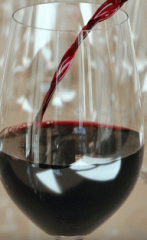An ingredient in red wine that energises cells, making them younger, has been confirmed in a new US study.
Scientists at Harvard Medical School have found that the resveratrol, an antioxidant compound, found in red wine, stimulated production of a serum called SIRT1, that speeds up energy production in the body’s mitochondria – this helps protect the body from disease.
Senior research author, David Sinclair, Harvard Medical School professor of genetics said: “In the history of pharmaceuticals there has never been a drug that binds to protein to make it run faster in a way that resveratrol activates SIRT1. Almost all drugs either slow or block them.”
Resveratrol occurs naturally in plants including red grapes and cocoa and protects them from the excessive effects of ultraviolet light, infections and climate changes.
Resveratrol has been linked to protection against obesity and diabetes, a reduced risk for blood clotting and a way to lower “bad” LDL cholesterol, due to the compound’s ability to dilate blood vessels, increase nitric oxide and block the stickiness of platelets.
It is important to note that Sinclair is a co-founder and scientific advisor of Sirtris, a GlaxoSmithKline company. Sirtris currently has a number of sirtuin (SIRT1)-activating compounds in clinical trials. GSK acquired the company in 2008 for $720m.
In another interview Sinclair said he wants to continue the studies to see if reveratrol can help people who are already really healthy.
“Things there are also looking promising. We’re finding that ageing isn’t the irreversible affliction that we thought it was,” he commented. “Some of us could live to 150, but we won’t get there without more research.”

